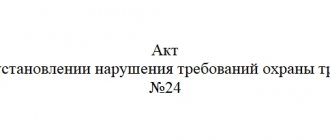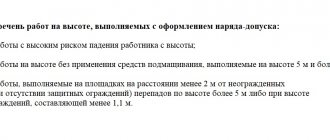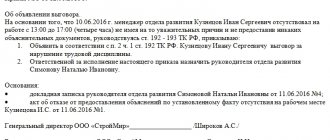An employee who ignores his job duties or performs them carelessly commits a disciplinary offense. Such actions lead to disciplinary sanctions of varying severity. Although there is no exhaustive list of disciplinary offenses in the legislation as such, separate articles of the Labor Code of the Russian Federation are devoted to disciplinary sanctions and their application. Are there objective criteria for a disciplinary offense and for what violations is disciplinary action applied? Let's figure it out.
What is meant by disciplinary offense ?
What is the definition of a disciplinary offense?
Article 192 of the Labor Code of the Russian Federation defines a disciplinary offense as failure to fulfill or incomplete, poor-quality performance of labor duties assigned to a citizen. Analysis of labor legislation allows us to identify the main features of a disciplinary offense:
- An illegal action is being committed that violates official or labor discipline.
- The employee's actions are his fault.
- Unlawful and guilty actions are subject to disciplinary liability.
In this case, the employee’s job responsibilities can be specified:
- labor legislation;
- local acts establishing internal labor regulations;
- instructions (job descriptions).
A disciplinary offense is always associated with the existence of an employment contract, which must stipulate the responsibilities of a working citizen. If his actions do not affect the provisions of the employment contract, such an offense can be excluded from disciplinary action. An employee who has received an order from management that violates the law has the right to refuse to carry it out. This is also not a disciplinary violation of labor relations.
If the employee did not fulfill the duties assigned to him, but his guilt was not established during the proceedings, it means that he did not commit a disciplinary offense.
There is no list of disciplinary offenses, as mentioned above. However, it is possible to identify certain types of such offenses and assess their severity. When imposing a disciplinary sanction, this criterion must be taken into account.
Types of disciplinary offenses
It is most important to determine whether there has been misconduct:
- intentional;
- without intent.
Example: an employee violated the order of technological actions in order to obtain the final result as quickly as possible and caused a defect. Another example: an employee committed the same violation with the same result intentionally, for personal reasons. It is clear that in the second case the punishment will be more severe.
In addition, the following offenses are distinguished:
- any employee who has entered into an employment contract;
- worker in a special field.
Certain categories of workers may commit offenses that have more severe and dangerous consequences. Their responsibility is regulated by special industry documents on labor, highly specialized federal legislative norms (transport workers, civil servants, nuclear workers, etc.).
Disciplinary offenses as grounds for dismissal at the initiative of the employer are mentioned in Art. 81 of the Labor Code of the Russian Federation, but the list of them is not limited to this article.
Misdemeanors of a disciplinary nature most often include:
- ignoring the orders of the manager or their negligent execution;
- ignoring production technologies and job descriptions;
- being late for work;
- absenteeism;
- drunkenness at work;
- refusal to undergo a medical examination if it is mandatory;
- damage to company property;
- theft, misappropriation of property.
What is a one-time gross violation of labor duties ?
Incomplete list of offenses for which penalties are imposed
Disciplinary offenses can be intentional or unintentional. According to their severity, they are classified as:
- insignificant or small;
- significant;
- rude.
This is important to know: Minimum length of special service for federal employees
Minor offenses are considered to be those that did not result in damage or injury. For example, non-statutory uniform of a serviceman, being late for duty or being discharged of a soldier undergoing military service upon conscription.
Gross misconduct that inevitably entails penalties are:
- Hazing relationships manifested in hazing (discrimination based on length of service) or fraternity (organization of groups according to the territorial principle of civilian residence).
- State of alcohol or drug intoxication.
- Skimping on official duties and leaving the place of duty without permission.
- Violation of the terms of the granted leave (delay or failure to appear).
- Neglect of the rules for daily duty or combat duty.
- Actions that resulted in malfunction or destruction of the material and technical base and property of a military unit.
- Incorrect handling of small arms, weapons and projectile equipment (ammunition), resulting in material damage or harm to human health.
For military personnel in the position of drivers, a significant offense is a violation of the Traffic Rules.
Responsibility
Disciplinary responsibility can be general or special. Article 192 of the Labor Code of the Russian Federation lists the following types:
- comment;
- rebuke;
- dismissal.
This is a general responsibility and may apply to all employees under an employment contract.
Special liability applies only to specialists in certain areas of the economy. For example, an official, according to Art. 57 Federal Law-79 dated 07/27/04 “On the State Civil Service”, a warning may be issued regarding incomplete compliance with the position held.
The list of punishments for disciplinary offenses is closed. The employer does not have the right to establish and apply penalties other than those established by the legislator.
On a note! Disciplinary liability can be applied together with other types of legal liability (administrative, criminal, etc.).
What happens if you grossly violate licensing requirements?
It is planned to make corresponding changes to the Code of Administrative Offenses of the Russian Federation. Article 14.1.3 of the Code of Administrative Offenses of the Russian Federation will be supplemented with Part 3, which implies new fines for gross violations of licensing requirements in the amount of 300,000 to 350,000 rubles. Now they can be held administratively liable under Part 4 of Art. 14.1 Code of Administrative Offenses of the Russian Federation.
The process of license revocation is simplified. If the management organization repeatedly commits gross violations of licensing requirements, which are provided for in subparagraphs “c”, “e”, “g” of paragraph 4(1) of the Russian Federation Regulations dated October 28, 2014 No. 1110:
- failure to conclude an agreement on gas and elevators,
- refusal to transfer technical and other documentation,
- non-cessation of management of the house after exclusion from the register,
within 12 months after the first violation, all houses of the management organization are excluded from the register and it is deprived of its license.
In the event of a repeated gross violation of the licensing requirements provided for in other listed paragraphs, within 12 months from the date of imposing an administrative penalty for violating licensing requirements, information about the apartment building or houses in respect of which such gross violations of licensing requirements were committed will be excluded from the register of licenses.
What to do: GZHI refuses to make changes to the register of licenses
101500
Documentation
IMPORTANT! Recommendations for registering the fact that an employee has committed a disciplinary offense from ConsultantPlus are available here
Any disciplinary offense must be documented. The employee has the right to appeal to the labor inspectorate, bodies that consider individual labor disputes, and the employer will have to prove his point of view on the basis of these documents.
The fact of a disciplinary offense is reflected in a memo addressed to the head of the company. In addition to the most negative fact, it should contain:
- time;
- link to the document whose provisions have been violated;
- consequences of irresponsible actions.
If the immediate supervisor of a negligent employee reports, he may recommend some form of disciplinary action.
Next, you need to obtain an explanation from the employee regarding the disciplinary offense in writing. If he refuses, an act recording the refusal is required, in which case the penalty can still be applied.
Then an order regarding the penalty and the procedure for its application is issued. The employee must sign the document indicating that he is familiar with the contents. The refusal here is recorded in the same way - by an act signed by three or more witnesses who are not personally interested in the application of the penalty.
Information about the punishment incurred may be reflected in the employee’s personal card, but this is not necessary. With the exception of the most severe - dismissal, disciplinary sanctions are not included in the work book.
Features of conducting an official investigation in case of violation of labor discipline by an employee.
Deadlines
The legislator sets the following deadlines:
- to submit a written explanation – 2 days;
- to familiarize yourself with the order - 3 days;
- from the date of discovery of the offense - 1 month for applying a penalty;
- from the date of commission of the offense - six months (if it is discovered later, no penalty is applied).
In some cases, the deadlines are extended. For example, a disciplinary offense based on the results of an audit of a company can be punished for 2 years.
The procedure and terms for applying disciplinary sanctions are established by Art. 193 Labor Code of the Russian Federation. The penalty is lifted after a year or earlier - at the request of the employee, at the request of the administration, at the request of the trade union (Article 194 of the Labor Code of the Russian Federation).
List of gross violations of licensing requirements
Amendments were made to the Decree of the Government of the Russian Federation dated October 28, 2014 No. 1110 “On licensing of business activities for the management of apartment buildings” - paragraphs 4(1) and 4(2) were added. The first lists gross violations of licensing requirements. In the second - punishment for committing them.
There are eight gross violations, most of them come into force on September 23. The first is failure to comply with the requirements established by part 2.3 of Art. 161 of the Housing Code of the Russian Federation (violation of the minimum list of works and services), resulting in harm to life or serious harm to the health of citizens. Failure to comply with such requirements must be confirmed by a court decision that has entered into legal force.
The second is the management organization’s failure to carry out hydraulic tests of input units and heating systems, flushing and adjustment of heating systems carried out in order to properly maintain heat supply systems in the house.
The third gross violation of licensing requirements is the failure to conclude work contracts within 30 calendar days from the date of commencement of execution of the management contract:
- for the proper maintenance of VDGO systems in accordance with the requirements established by Decree of the Government of the Russian Federation of May 14, 2013 No. 410;
- for the operation, maintenance and repair of elevators, lifting platforms for the disabled in accordance with the requirements established by Decree of the Government of the Russian Federation dated June 24, 2017 No. 743. An exception is the performance of work on the operation, maintenance and repair of the listed equipment by management organizations independently.
The next gross violation of licensing requirements is failure to fulfill obligations under the management agreement provided for in Part 2 of Art. 162 of the Housing Code of the Russian Federation - failure to conclude, within 30 calendar days from the date of commencement of the execution of the management agreement, contracts with the RSO for the purpose of acquiring utility resources for the maintenance of common property in the apartment building.
The fifth gross violation is that the licensee has a debt recognized by him or confirmed by the court to the RSO in an amount equal to or exceeding two average monthly obligations. This refers to any debt to resource providers. Payment of the said debt does not cancel the violation.
What can be done? We recommend not to sign acts with debt, that is, not to acknowledge debt. If the case goes to court, pay off the debt with current payments until a decision is made. It is imperative to do this before a court decision is made, because the fact of subsequent payment, after recognition of the debt by the court, no longer cancels the violation.
The sixth gross violation of licensing requirements is refusal to transfer, in cases established by law, technical documentation for the house and other documents related to the management of the house, keys to premises of common property, electronic access codes to equipment included in the common property, other technical means and equipment necessary for the operation and management of the house by a new management company, HOA, residential complex or housing cooperative. Or, with direct management, to one of the owners. If the owner’s data is indicated in the OSS decision on choosing a method of managing the house, the documentation is given to him, if not indicated, to any owner.
Evasion from transfer, violation of the order and timing of transfer of technical documentation to the apartment building and other documents, technical means and equipment related to the management of such a house will also be considered a gross violation. So treat the maintenance and storage of technical documentation for your home with all possible attention.
You will flagrantly violate licensing requirements if you do not stop managing an apartment building within 3 days from the date of exclusion of information about such a building from the register of licenses of a constituent entity of the Russian Federation. An exception is the continuation of such activities in accordance with the provisions of Part 3 of Art. 200 of the Housing Code of the Russian Federation, that is, until a new management organization, HOA or residential complex is selected for the house, or the owners enter into agreements with the RSO and agreements for the maintenance and repair of common property.
Another gross violation will be a violation of the requirements for the implementation of emergency dispatch services provided for in paragraph 13 of Rules No. 416. We are talking about the immediate elimination of blockages in the in-house utility drainage system and garbage chutes, the elimination of emergency damage to the in-house utility systems of cold and hot water supply, sewerage and in-house heating and power supply systems.
The comforting news is that this paragraph comes into force on March 1, 2019, since the new requirements for emergency dispatch services, which were approved by Decree of the Government of the Russian Federation dated March 27, 2018 No. 331, come into force on March 1, 2021.
How is the procedure for depriving a management organization of a license carried out?
59930
Controversial situations and nuances
Let us note several important nuances of disciplinary offenses and the application of penalties for them.
You cannot be fined for disciplinary offenses, but an employee can be deprived of bonuses if such a measure is contained in the LNA (app. definition of the Supreme Court of the Republic of Tatarstan, No. 33-11761/2013 dated 09/26/13).
Can unethical behavior be punished? The judges believe that it is possible (Moscow City Court, ruling No. 33-8753/2012 of 04/10/12). The chances of receiving a disciplinary sanction are especially high if there is a LNA that establishes the norms of corporate ethics of the company.
A similar opinion was expressed by the Ministry of Labor (letter No. 14-2/B-888 dated 09/16/16). Rude, derogatory language in the workplace towards a client is unacceptable. At the same time, there is also extensive judicial practice when judges do not recognize unethical behavior of an employee in relation to management as such, but define it as the exercise of the right to freedom of speech (Article 29 of the Constitution of the Russian Federation, S-P City Court decision No. 33-5330 dated 08 /04/13).
Important! For violating the procedure for applying penalties, the employer himself may be punished with a fine in the amount of 1 to 5 thousand rubles. A fine for the organization is from 30 to 50 thousand rubles. In case of repeated violation, the amounts increase (Article 5.27 of the Administrative Code).
The most important
- Negligent performance or neglect of job duties is called a disciplinary offense. Disciplinary liability is established for such an act. The list of disciplinary punishments in the Labor Code of the Russian Federation is closed. The most severe is dismissal.
- In addition, there are penalties relating to certain groups of workers. They are established by special regulations, Federal Laws.
- Documentation of the disciplinary offense is mandatory. It includes a memo, written explanations from the employee and an order to impose a penalty.
- Violation of the procedure and deadlines for applying a penalty (Article 193 of the Labor Code of the Russian Federation) makes it illegal. Along with disciplinary penalties, other penalties may be applied for violation of labor laws.
Legal consultation: Proceedings regarding gross disciplinary offense
Question:
Hello! What document formalizes the decision to conduct an investigation into the commission of a gross disciplinary offense and how is the time frame for conducting this investigation and the period for applying a disciplinary sanction from the moment the disciplinary offense is discovered?
Anna, 24 years old, Kemerovo
Answer:
Hello Anna. In accordance with Art. 81 of the Disciplinary Charter of the Armed Forces of the Russian Federation, approved by Decree of the President of the Russian Federation of November 10, 2007 No. 1495 “On approval of general military regulations of the Armed Forces of the Russian Federation” (hereinafter referred to as the Disciplinary Charter), the decision by the commander (chief) to apply a disciplinary sanction to a subordinate serviceman is preceded by a trial.
The proceedings are carried out in order to identify the perpetrators, identify the causes and conditions that contributed to the commission of a disciplinary offense.
The proceedings, as a rule, are conducted by the immediate commander (superior) of the serviceman who committed the disciplinary offense, or by another person appointed by one of the direct commanders (superiors). In this case, the serviceman appointed to conduct the proceedings must have a military rank and military position not lower than the military rank and military position of the serviceman who committed the disciplinary offense.
In the cases specified in Art. 75 of this Charter, the proceedings are conducted by the head of the garrison, the senior naval commander, the military commandant of the garrison, the head of military communications on modes of transport, the head of military roads, the military commandant of the railway (water) section and station (port, airport) or persons appointed by them.
The proceedings, as a rule, are conducted without the preparation of written materials, except for cases where the commander (chief) has demanded that the materials of the proceedings be submitted in writing.
The materials of the proceedings regarding gross disciplinary offenses are documented only in writing.
During the proceedings it must be established:
event of a disciplinary offense (time, place, method and other circumstances of its commission);
the person who committed the disciplinary offense;
the serviceman’s guilt in committing a disciplinary offense, the form of guilt and the motives for committing a disciplinary offense;
data characterizing the personality of the serviceman who committed a disciplinary offense;
the presence and nature of the harmful consequences of a disciplinary offense;
circumstances excluding disciplinary liability of a serviceman;
circumstances mitigating disciplinary liability and circumstances aggravating disciplinary liability;
the nature and degree of participation of each of the military personnel in the commission of a disciplinary offense by several persons;
reasons and conditions that contributed to the commission of a disciplinary offense;
other circumstances that are important for the correct resolution of the issue of bringing a serviceman to disciplinary liability.
The commander (chief) has the right to decide to punish a serviceman who has committed a disciplinary offense using his own authority or, within up to 10 days, to submit to a superior commander (chief) the materials of the proceedings on the commission of a disciplinary offense by the serviceman for a decision to be made.
When a serviceman commits a gross disciplinary offense (Appendix No. 7) or upon receiving information about its commission, the immediate commander (superior) of the serviceman is obliged to immediately report this in the prescribed manner to the commander of the military unit.
The commander of a military unit decides to conduct an investigation into the commission of a gross disciplinary offense and appoints someone responsible for its conduct.
The investigation into the fact that a serviceman has committed a gross disciplinary offense ends with the drawing up of a protocol (Appendix No. 8). When conducting proceedings regarding the commission of a gross disciplinary offense by a group of military personnel, a protocol is drawn up in relation to each of these military personnel.
The protocol, along with the materials of the proceedings, is provided for review to the serviceman who has committed a gross disciplinary offense, after which it is sent to the commander of the military unit for consideration. The commander (chief) or the person who conducted the proceedings sends a proposal to the commander of the military unit regarding the period of disciplinary arrest that would be appropriate to assign to the serviceman, or to apply another type of disciplinary sanction to him.
The commander of a military unit is obliged, within up to two days, to review the protocol and materials on the commission of a gross disciplinary offense and make a decision either to send them to the garrison military court, or to apply another disciplinary sanction to the serviceman as provided for in this Charter.
In cases where the circumstances of a serviceman committing a gross disciplinary offense are established by a previously conducted audit, inspection or administrative investigation or materials on an administrative offense, a hearing by the commander of the military unit may not be ordered. If a trial is not scheduled, the commander of the military unit appoints an officer to draw up a protocol and determines the period for its preparation, which should not exceed three days.
If during the proceedings it turns out that the disciplinary offense contains signs of a crime, the commander of the military unit, in accordance with the legislation of the Russian Federation, initiates a criminal case and notifies the military prosecutor and the head of the military investigative body of the Investigative Committee of the Russian Federation.
According to Art. 83 of the Disciplinary Charter, the application of a disciplinary sanction to a serviceman who has committed a disciplinary offense is carried out within 10 days from the day when the commander (chief) became aware of the disciplinary offense committed (not counting the time for conducting proceedings, proceedings in a criminal case or in an administrative case). offense, the time of illness of the serviceman, his being on a business trip or leave, as well as the time he performed a combat mission), but before the expiration of the statute of limitations for bringing the serviceman to disciplinary liability.
A serviceman who considers himself innocent has the right to file a complaint within 10 days from the date of application of the disciplinary sanction.
Alexander Tomenko, military lawyer
Ask your question









